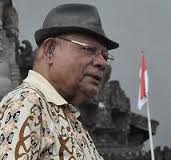The situation in Jayapura city, in particular, and Papua Province, in general, seems to be peaceful, after being hit by random shooting incidents committed by unknown people.
Police personnel and military troops, however, are still stationed at several spots in Jayapura.
The security situation was quite worrying last weekend following the death of Mako Tabuni, one of the coordinators of the National Committee for West Papua (KNPB). Some mourners went on a crime spree, burning shops, cars and other motor vehicles, as well as torturing people in Waena, Jayapura.
Tabuni died after being shot by police, who were trying to arrest him for his alleged involvement in recent shooting incidents in Jayapura and surrounding areas.
In response to a series of shooting incidents and violence in Papua, the Indonesian government has reiterated its commitment to pursuing an approach of focusing on the welfare of the community, instead of a military approach, to deal with problems in the country`s eastern most province.
Coordinating Minister for Political, Legal and Security Affairs, Djoko Suyanto, reaffirmed the non-military approach when meeting with community and religious leaders and members of the Papuan Legislative Council (DPRP) and the Papuan People Assembly (MRP) in Jayapura, the capital of Papua, on June 18.
He stated that the government hoped to “bring Papua into harmony with the Unitary State of Indonesia (NKRI)”.
“Until now, the approach used is welfare and not military, because a military approach is only useful for dealing with crimes,” Djoko said.
Minister Djoko began a working visit to Papua on Monday (June 18), along with Chief of the Indonesian Defense Forces (TNI) Admiral Agus Suhartono, National Police Chief General Timur Pradopo and Chief of National Intelligence Agency Marciano Norman.
On Tuesday afternoon (June 19), he was scheduled to travel to Timika, Mimika District, where the US copper and gold mining company PT Freeport, often a target of sporadic shootings, is located.
Papua has been given a special autonomy status, but the implementation of the development programs have not yet met public expectations, although the government set up the Papua and West Papua Development Acceleration Unit (UP4B) in 2012 to boost developments on the Papua island.
Velix Wanggai, a presidential special staff member in charge of regional development and autonomy, said in a press statement in Jakarta on Sunday (June 17) that the government remains committed to developing Papua into a land of peace, as declared by President Susilo Bambang Yudhoyono in 2004.
President Yudhoyono is pursuing peaceful approaches and dialogs to solve the problems in Papua, according to Velix.
The government has a comprehensive design consisting of five points on Papua, including affirming Indonesia`s unitary state while respecting Papua`s diversity and uniqueness; optimizing Papua’s status as a special autonomous region; pursuing affirmative policies to recognize the basic rights of Papua people, such as access to education; designing strategies, policies, funding and programs to promote development and empower the Papua people; and promoting human rights as well as preventing violence.
Before leaving for the G20 Summit in Mexico last week, Yudhoyono asked Minister Djoko to examine the cause of problems in Papua that have led to a number of recent violent incidents in the region.
With regard to cases linked to separatism, he said, they were against the law and would be dealt with according to the law. Yudhoyono added that the law of the country also applied to Papua and there was no discrimination involved.
He told his ministers that although security disruptions in Papua could be categorized as small-scale incidents, the government would not ignore the loss of lives and take action immediately.
Over the last several months, Indonesia`s easternmost province of Papua has seen random shootings in various locations. The latest shooting incident occurred at the University of Cendrawasih`s campus on Sunday evening (June 10).
On June 5, unidentified people shot three people, identified as Iqbal Rifai, aged 22, a resident of Hamadi Pasar; Hardi Jayanto, aged 22, a resident of Klolfkam; and First Private Frangki Kune, aged 25, resident of the Waena Combat Engineering Corps station.
Arwan, a civil servant of the XXVII Cenderawasih Military Regional Command Headquarters, was shot by unknown gunman and later died while being treated for his wound at a local hospital on June 6.
On May 29, 2012, German national Pieter Dietmar Helmut (55) was shot at the Base G beach in Jayapura. Several days later, the wounded German tourist was evacuated to a Singapore hospital.
Minister Djoko condemned the recent shootings of civilians, foreigners, military and police personnel in Papua. “The acts were against the efforts aimed at creating peace in Papua and accelerating development programs in the region,” he told the press.
“The security personnel are investigating and studying the case. Such violence must be stopped. The local police and TNI must find the perpetrators,” the minister said.
During a hearing with the Parliament on Monday, Marciano Norman, the head of the National Intelligence Agency (BIN), Indonesia`s intelligence agency, said that a separatist group called the Free Papua Movement (OPM) was behind the recent shootings in Papua.
In order to stop shooting incidents, the Indonesian Papuan University Students Movement (GMPI) has requested that local police again compile an inventory of gun ownership by civilians in Indonesia`s eastern most province of Papua.
Further, security authorities must address security problems by establishing an inventory of firearms ownership in Papua, GMPI Chairman Habelino S Sawaki said in Jayapura recently.
Sawaki said he believed that guns had been smuggled into Papua over the Papua and Papua New Guinea border. The border stretches some 800 km and is guarded by four battalions of soldiers.
“With only four battalions guarding the border, it`s easy to smuggle in guns,” Habelino said.
He urged the Indonesian Defense Forces (TNI) and the National Police to deal with shooting incidents in order to create peace in Papua. He also asked the Papuan people to help security officers maintain security and peace.
Source: ANTARA News




